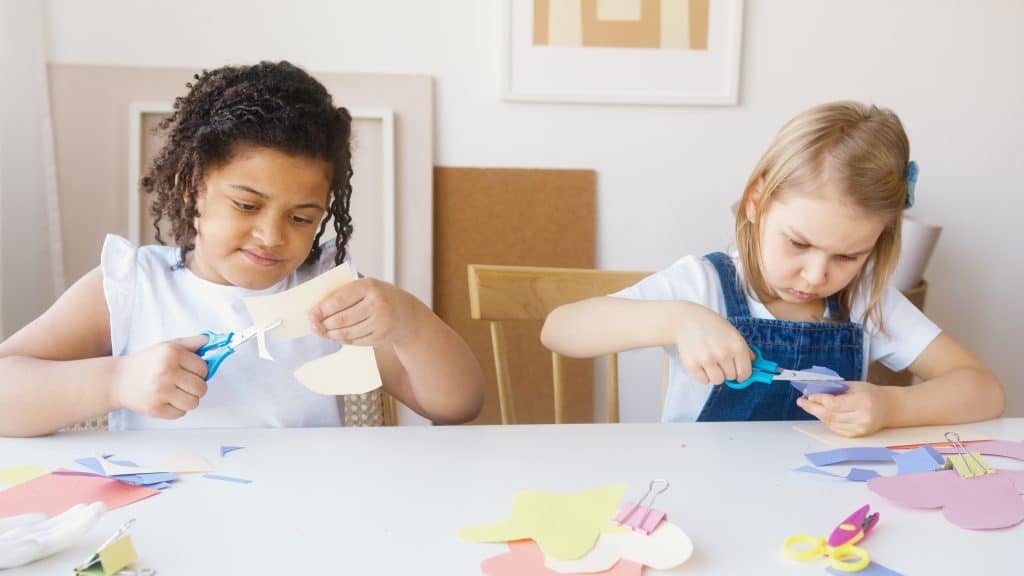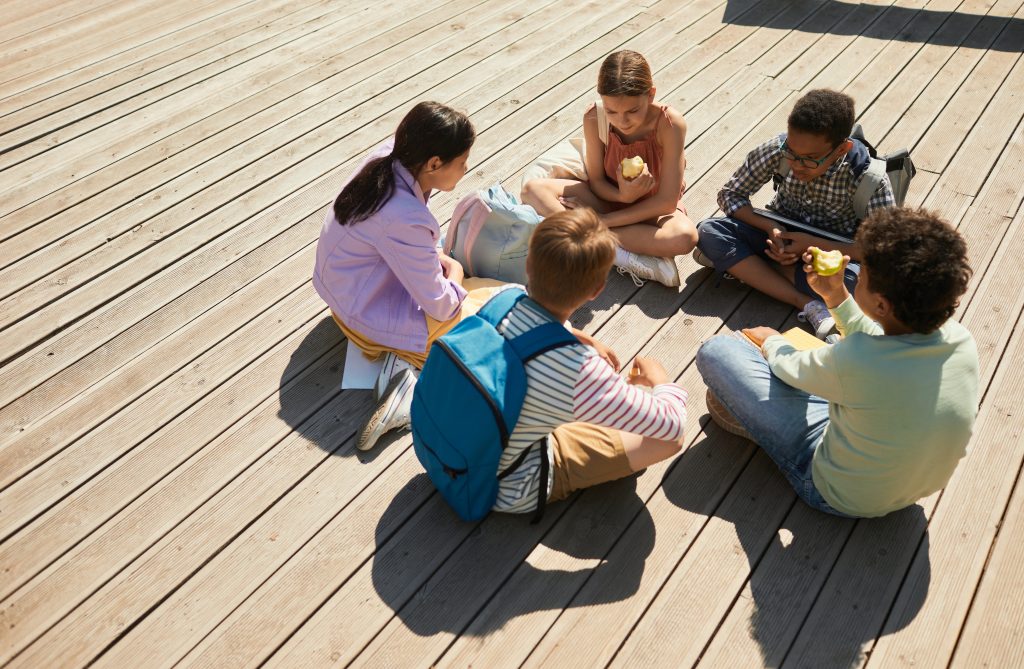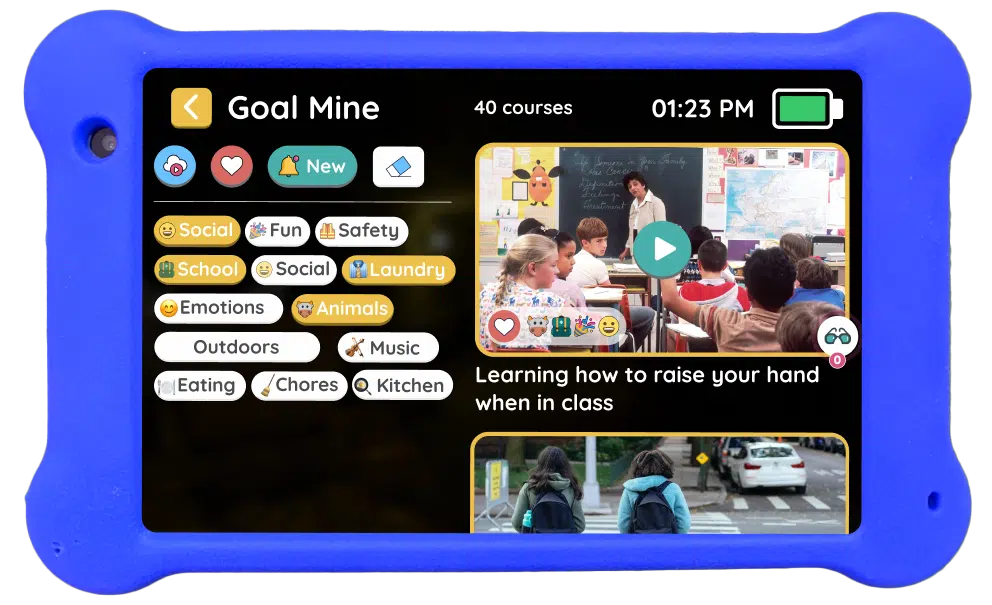We all know that friendships play a crucial role in our children’s lives, right? Kids who have more mutual friendships are reported to have higher levels of self worth. Friendships help kids develop emotionally, learn valuable social skills, and create a sense of belonging. But as parents, we often find ourselves wondering how we can help our child make friends. In this blog, we’ll explore the importance of friendships for children’s development, the role we play as parents in helping them develop social skills, and how to support your child in making friends. Let’s dive in!
Table of Contents
Step 1: Take Time to Observe and Understand How Your Child Socializes
The first step to helping your child make friends is to take some time to observe and understand their social preferences and abilities. After all, every child is unique, and what will work for one child may not necessarily work for another. So, why not start by asking yourself some questions about your child’s socializing habits? How does your child typically interact with their peers? Do they seem comfortable in group settings or more at ease one-on-one? By observing and understanding your child’s social tendencies, you’ll be better equipped to support them in forming meaningful friendships.
Next, let’s focus on identifying your child’s strengths and weaknesses when it comes to socializing. This includes:
- Social Styles: Introvert, Extrovert, or Ambivert – Does your child tend to be more outgoing and energetic, or do they prefer quieter, more introspective activities? Or maybe they’re somewhere in between? Understanding your child’s social style can help you guide them toward friendships that suit their personality.
- Communication Skills – How well does your child express themselves verbally and nonverbally? Are they able to articulate their thoughts and feelings effectively, or do they struggle to find the right words? Improving communication skills can make a significant difference in your child’s ability to form lasting friendships.
- Emotional Intelligence – Is your child able to recognize and manage their own feelings, as well as empathize with the feelings of others? Developing emotional intelligence is crucial for building strong, healthy relationships.
Read More: 5 Books About Friendship for Kids
Adjust Your Approach for Making Friends Based on Your Child’s Personality
Once you’ve taken the time to observe your child and identify their social strengths and weaknesses, you can then tailor your approach to best support their unique needs. For example, if your child an introvert, you might encourage them to form friendships through shared interests or hobbies rather than large, noisy gatherings. Or, if your child has difficulty expressing themselves, you could explore different ways to help them improve their communication skills, such as practicing active listening or using visual aids to express emotions. Remember, there’s no one-size-fits-all solution when it comes to helping your child make friends, so it’s essential to be flexible and adapt your strategies to their specific needs and personality.

Step 2: Model Positive Social Behavior for Making Friends
| Social Skill | Modeling the Skill | Benefits for Your Child |
|---|---|---|
| Empathy | Show genuine concern for others, practice active listening, and express understanding of others’ emotions. | Teaches your child to understand and share the emotions of others, building strong and meaningful connections. |
| Respect for Boundaries | Teach the importance of others’ perspectives, emotions, and personal space. Model asking for consent before physical contact. | Helps your child form healthy, respectful relationships by understanding and honoring personal boundaries. |
| Teamwork and Cooperation | Involve your child in group activities that require sharing, taking turns, and compromising. Promote appreciation for diverse skills and perspectives. | Develops your child’s ability to work well with others, highlighting the importance of collaboration in social interactions. |
Tips for Parents to Practice Positive Social Behavior at Home
Ready to put these ideas into action? Here are some practical tips for modeling positive social behavior at home:
- Be mindful of your language and tone when speaking to others, including your spouse and children.
- Actively participate in your child’s social activities, such as playdates or parent-teacher conferences, to model respectful and positive interactions.
- Share stories about your own friendships and discuss the lessons you’ve learned from them.
- Encourage family discussions where everyone has the opportunity to express their thoughts and feelings openly.
- Practice gratitude and appreciation for others by regularly acknowledging the kindness and support you receive from friends and family.
Step 3: Model and Show What Making Friends Look Like
Discuss the Qualities of a Good Friend
One way to help your child understand what a good friendship looks like is to discuss the qualities that make someone a good friend. You could ask your child, “What do you think makes a person a good friend?” and share your own thoughts on the subject. Some examples might include trustworthiness, kindness, honesty, and being a good listener. By having these conversations, you’ll help your child develop a clear understanding of the type of friendships they should strive for.
Share Personal Experiences and Stories About Friendships
Sharing your own personal experiences and stories about friendships can be a powerful way to illustrate the importance of healthy relationships. Talk about the friendships you’ve had throughout your life, both the positive and the challenging ones. Discuss the lessons you’ve learned and how those friendships have shaped you as a person. Your personal experiences can serve as valuable teaching moments for your child.

Address Potential Friendship Challenges and Conflicts
It’s important to acknowledge that not all friendships are perfect, and conflicts may arise. Discuss potential challenges your child might face in their friendships and explore healthy ways to resolve conflicts. Encourage open communication, empathy, and compromise as key strategies for navigating difficult situations.
Watch Movies or Reading Books That Portray Healthy Friendships
Movies and books can be excellent tools for showcasing positive examples of friendships. Choose age-appropriate content that features strong, supportive relationships between characters. After watching a movie or reading a book together, take the opportunity to discuss the friendships portrayed and what your child can learn from them.
Teaching the Importance of Inclusivity and Diversity when Making Friends
Help your child understand the value of forming friendships with people who may be different from them in terms of background, culture, or abilities. Explain that diverse friendships can enrich their lives by exposing them to new perspectives and experiences. Encourage your child to be open-minded, accepting, and inclusive when making friends.
Step 4: Help Them Meet New Friends for the First Time
Prepare for the First Interaction
- Discussing Potential Conversation Starters – Before your child meets new friends, brainstorm some conversation starters together. This might include questions about hobbies, favorite activities, or experiences. Having a few conversation starters in mind can help your child feel more confident when approaching new people.
- Role-Playing Social Scenarios – Practice makes perfect! Help your child feel more comfortable in social situations by role-playing scenarios they might encounter. This could include introducing themselves, asking someone to play, or navigating a disagreement.
- Encouraging Confidence and Self-Esteem – A confident child is more likely to form strong friendships. Remind your child of their strengths and unique qualities, and encourage them to be proud of who they are.
Find Opportunities to Make Friends
- Enrolling in Clubs or Activities – Encourage your child to join clubs or activities that align with their interests. This will provide a natural environment for them to meet like-minded peers and form new friendships.
- Attending Community Events – Take your child to local events such as festivals, fairs, or neighborhood gatherings. These events offer opportunities to meet new people and engage in social activities.
- Encouraging Playdates and Get-Togethers – Organize playdates and get-togethers with other children, providing a relaxed environment for your child to make new friends.
Teach Essential Social Skills for Making Friends
- Active Listening – Teach your child the importance of active listening, such as nodding, making eye contact, and asking questions. This skill will help them build stronger connections with others.
- Empathy and Compassion – Encourage your child to be understanding and compassionate towards others. Talk about the importance of considering other people’s feelings and being supportive during tough times. By developing empathy and compassion, your child will be better equipped to form meaningful, lasting friendships.
- Conflict Resolution and Problem-Solving – Help your child learn effective conflict resolution and problem-solving strategies. Teach them to stay calm, communicate openly, and find mutually satisfying solutions when disagreements arise. These skills will not only help them maintain strong friendships but will also be valuable throughout their lives.
Encourage Patience and Persistence When Making Friends
Making friends can take time, and it’s important to remind your child that patience and persistence are key. Encourage them to keep trying and not get discouraged by setbacks or rejections. As they continue to practice their social skills and engage in new social situations, they’ll become more comfortable and confident in making friends.
Step 5: Reinforce and Praise Efforts to Make Friends
When your child exhibits positive social behavior, it’s essential to acknowledge and reinforce their efforts. Positive reinforcement can boost your child’s self-esteem and encourage them to continue practicing valuable social skills. So, when you see your child being kind, sharing, or showing empathy, be sure to praise them for their actions.

While it’s essential to praise your child’s successes, it’s also important to offer constructive feedback when they struggle with social interactions. Instead of criticizing, try to provide guidance and support, helping them understand how they can improve in the future. This approach not only fosters a growth mindset but also helps your child become more receptive to feedback and learn from their mistakes.
Goally | Learning Videos for Kids
Does your child need some extra guidance making friends? Goally’s skill building tablet for kids includes a TV app that has the most robust video library of skills training videos for kids. Ranging from content like “How to Brush Your Teeth” to “How to Make Friends at School,” we have dozens of interactive video lessons for kids with thinking and learning differences.

Dive into the Goal Mine channel, where Puffy the Penguin leads your child through behavior skills training videos. They’ll learn social, hygiene, and living skills that are key to their independence. For those moments when they need a break, the Chill Zone channel offers low stimulation video content with Paulie the Penguin at the beach, perfect for relaxation and self-regulation.
Try Goally as an app on any device you have at home for just $15. We also have a dedicated tablet (which ONLY has Goally on it) for $149.
As parents, it’s crucial to stay involved and supportive throughout your child’s journey of making friends. Remember that your guidance, encouragement, and understanding can make a significant difference in your child’s social success. Keep modeling positive social behaviors, providing constructive feedback, and emotional support and you will be able to help your child to make friends!
This post was originally published on 03/28/2023. It was updated on 06/07/2023.

Goally
We help parents teach their kids life skills, like doing bedtime and morning independently. Backed by science, we incorporate evidence-based practices and expert-informed designs in all of our apps and content.





